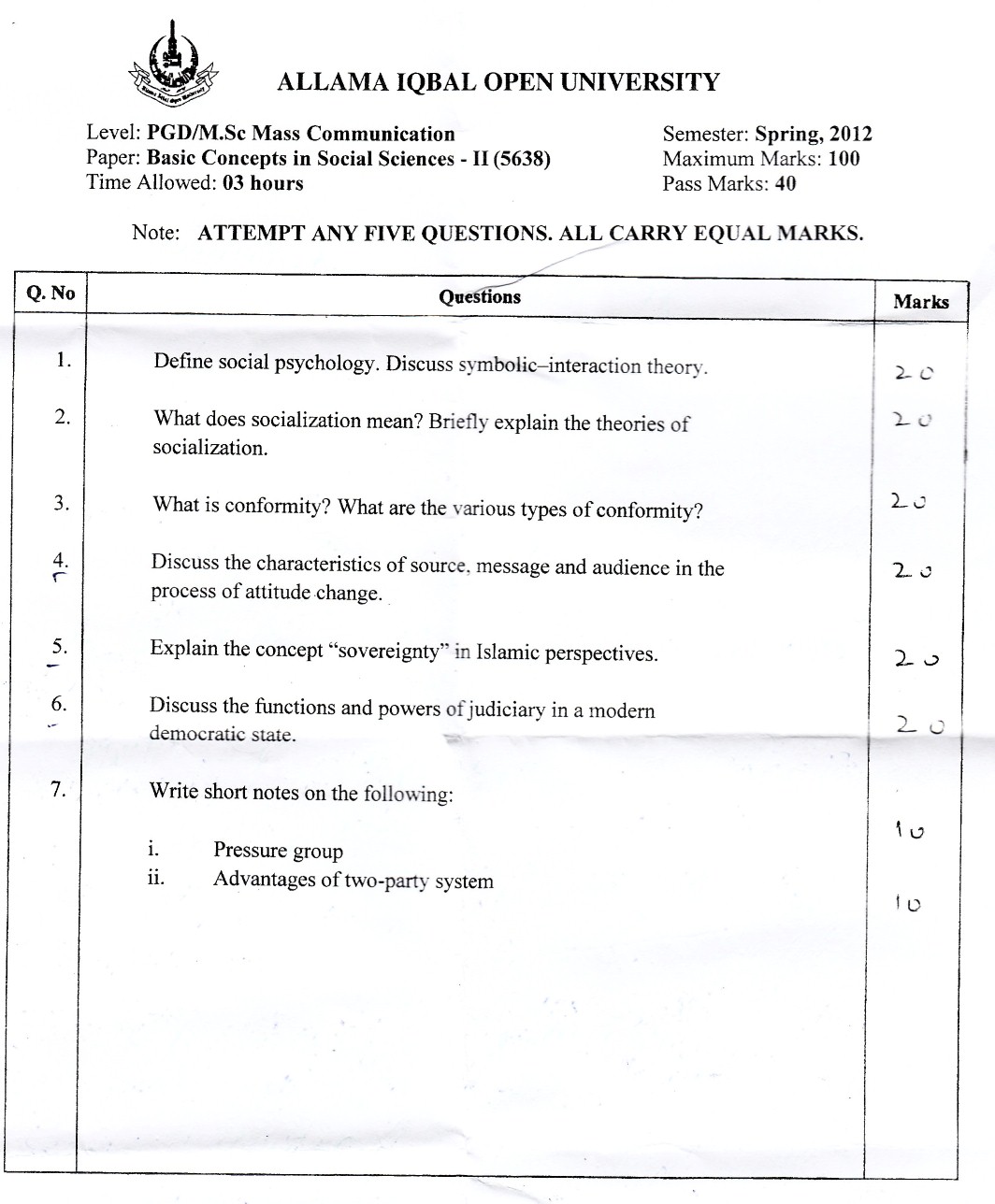ALLAMAIQBAL OPEN UNIVERSITY Level: PGD/M.Sc Mass Communication Paper: Basic Concepts in Social Sciences – II (5638) Semester: Spring, 2012 Maximum Marks: 100 Pass Marks: 40 Time Allowed: 03 hours ATTEMPT ANY FIVE QUESTIONS. ALL CARRY EQUAL MARKS. 1.Define social psychology. Discuss symbolic-interaction theory. 2.What does socialization mean? Briefly explain the theories of socialization. 3.What is conformity? What are the various types of conformity? 4.Discuss the characteristics of source, message and audience in the process of attitude change. 5.Explain the concept of “sovereignty” in Islamie perspectives. 6.Discuss the functions and powers of judiciary in a modern democratic state. 7.Write short notes on the following: i)Pressure group ii)Advantages of two party system
Basic Concepts in Social Sciences -1 CODE: 5637
ALLAMAIQBAL OPEN UNIVERSITY Level: PGD/M.Sc Mass Communication Semester: Spring, 2012 Paper: Basic Concepts in Social Sciences -1 (5637) Time Allowed: 03 hours Maximum Marks: 100 Pass Marks: 40 Note: ATTEMPT ANY FIVE QUESTIONS. ALL CARRY EQUAL MARKS. Q. No. Questions What do you know about sociology? Describe its characteristics and also explain how can we term sociology as a science? Explain the various aspects of culture. How is it different from society? Discuss significance of culture? What is meant by an institution in sociology? What are the basic institutions in • complex societies? What is inflation? What factors cause inflation and how is it controlled? Explain the monetary system by describing bi-metabolism system of note issue and value of money. Define the concept of stock market with special reference to Pakistan. Explain the main features of our economy. What are the obstacles to our economic growth? What […]
judiciary organization, function and power
Explain judiciary and the rule of law, organization of judiciary, its function and power. The Judiciary: Judiciary is the third organ of the government which is responsible for the administration of justice according, to the law of the .land enacted by the executive and made by the legislature. The concept of the welfare state is directly linked with social justice with impartiality and expeditiousness. An efficient judiciary is necessary for a good governance as it protects the individual rights of people in their public life. An efficient administration of justice maximizes the responsibility of a citizen in a state. It there is no effective judicial system, then there will he no law at all and the principle of “Might is right” will prevail. Severity of punishment does not but certainty of punishment does compel the offenders to abide by law. In ancient times, the executive and judicial function were combined […]
State and its Elements, How the West and Islam see sovereignty?
Define state and its elements. Explain how the West and Islam see sovereignty. Definitions of State: Different scholars have defined “State” differently. Definitions of the few are described below. Aristotle defined it as ” a community of families and villages having for its end a perfect and self-sufficing life, by which we mean a happy and honourable life”. Holland defines the State as “a numerous assemblage of human beings, generally- occupying a certain territory, amongst whom the will of the majority or of an ascertainable class or persons is by the strength of such a majority or class made to prevail against any of their number who oppose it”. Bluntschli holds: “the state is the politically organized people of a definite territory”. Woodrow Wilson defines it simply as “people organized for law within a definite territory”. Maclver defines the state as “an association which, acting through law as promulgated […]
Salient Feature of the 1973 Constitution of Pakistan
Discuss the salient features of the 1973 Constitution of Pakistan. Salient Feature of the 1973 Constitution of Pakistan: The present Constitution is the third constitution of the country which was drafted and passed by the National Assembly of Pakistan on April 10, 1973. It was authenticated by the president on April 12, 1973 and enforced on August 14, 1973. Following are the main characteristics of this constitution. 1) A Written Constitution The Constitution of 1973 is written with a preamble, 280 Article, 6 Schedules and a few Amendments. Political Usage’s and Traditions are yet to emerge and develop side by side with the constitution of Pakistan. 2) Flexibility The Constitution is neither too rigid like the American Constitution nor too flexible like the British Constitution. It can he amended if 2/3 majority of the total strength of the National Assembly approves an amendment in it and when the same is […]
Types and Examples of Collective Behaviour
What is collective behaviour? Discuss different types and examples of collective behaviour. Also narrate theoretical approaches to the study of collective behaviour. Collective Behaviour: Collective behaviour has been generally applied to these events and refers to group behaviour which originates spontaneously, is entirely unorganized, fairly unpredictable and planless in course of development, and which depends on interstimulation among participants. Examples of collective behaviour include panics, revolutions, riots, lynching, manias, crazes, and fads. Traditional approaches to the study of collective behaviour have emphasized the importance of emotion, suggestibility and irrationality in the understanding of collective episodes. Types and Examples of Collective Behaviour The term collective behaviour has been applied to a broad range of group activities ranging from a rather spontaneous and short lived actions of a crowd to the more organized, structured and long-term experiences of a major social movement. – The Crowd We attend the theatre and game events […]
